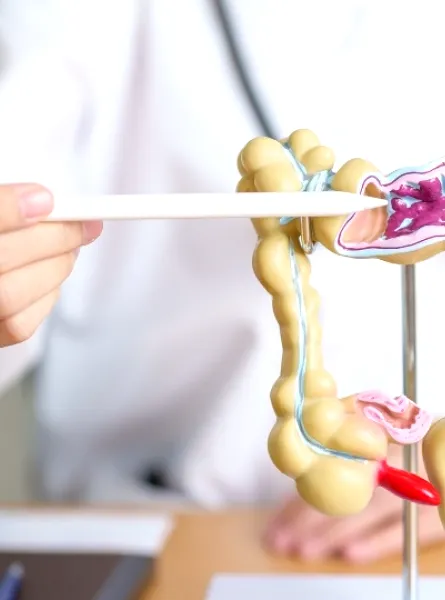
The gut microbiome is being talked about more and more when it comes to health. And it’s true: the billions of microorganisms living in our digestive system have a major impact on our well-being. But with this growing popularity comes plenty of misconceptions. Between media coverage, food trends, and “health” products on the market, it can be hard to separate fact from fiction.
In this article, our registered dietitians break down the most common myths on the subject, to help you better understand your microbiome and make informed decisions.
Myth 1: You can never have too much fibre
Fibre is a powerful ally for the microbiome: it feeds our good bacteria and promotes regular bowel movements. However, how fibre is introduced into the diet makes all the difference. A sudden increase can actually backfire, causing bloating, cramps, and intestinal discomfort.
To fully benefit from fibre, the key is gradual progression. It’s recommended to increase fibre intake slowly — about 5 g more per day for a week, then adjust based on tolerance. Start with “gentle” fibres, meaning those that are less fermentable and usually easier on the gut. Examples include chia seeds, oranges, carrots, zucchini, and quinoa.
The goal remains to reach a high intake of fibre to maximize benefits, but in a progressive, personalized, and strategic way — always with proper hydration.
Myth 2: Bloating always means a food intolerance
Many people associate bloating and digestive discomfort with lactose intolerance, gluten intolerance, or other food sensitivities. But that’s not always the case. Bloating can have many other causes, such as:
- Eating too quickly (which increases swallowed air)
- Consuming carbonated drinks (sparkling water, sodas, beer)
- Eating too much fibre or adding it too suddenly
- Certain naturally “gas-forming” foods, like legumes (chickpeas, lentils), broccoli, cabbage, onions, garlic, or apples
- Stress and anxiety, which directly affect digestive function
- Hormonal variations, such as around menstruation
In many cases, bloating is caused by a combination of factors rather than a single food intolerance. Before cutting foods from your diet, it’s best to pay attention to your habits, keep a food journal, and consult a dietitian to better identify triggers.
Myth 3: Gluten is harmful to the microbiome and digestion
Gluten is a protein found in wheat, barley, and rye. For people with celiac disease or gluten sensitivity, avoiding it is essential. But for most of the population, there is no scientific reason to eliminate gluten.
Gluten-free products aren’t automatically better for digestion. Often, these processed foods contain more sugar, fat, or additives to compensate for texture and taste. Cutting gluten unnecessarily can also reduce dietary variety and increase the risk of nutrient deficiencies, particularly fibre. Lower fibre intake can reduce the diversity of the gut microbiome, which plays a role in digestive health and immunity.
If you suspect an intolerance, it’s important to consult a registered dietitian specialized in digestive health to safely and effectively adjust your diet.
Myth 4: The microbiome only affects digestion
The gut microbiome impacts much more than just digestion. This community of microorganisms has wide-reaching effects on health, well beyond the digestive system:
- Strengthening the immune system: it plays a key role in protecting against infections and modulating immune responses.
- Reducing inflammation: a balanced microbiome supports a healthy gut environment and helps limit chronic inflammation, often linked to various diseases.
- Vitamin synthesis: some gut bacteria produce vitamin K and B vitamins, essential for metabolism and overall health.
- Regulating the gut-brain axis: the microbiome can influence mood, stress, and even sleep through neurotransmitter production and communication with the brain.
And much more!
This means that taking care of your gut microbiome doesn’t just reduce digestive discomfort — it also contributes to overall health and balance. On the flip side, an imbalance in the microbiome, known as dysbiosis, has been linked to digestive issues and may play a role in certain metabolic and inflammatory conditions.
Curious to learn more about your gut microbiome? Discover Biron’s microbiome test, which analyzes the composition and diversity of your gut bacteria to identify your specific digestive and dietary needs.
Myth 5: Only diet influences the microbiome
It’s true that diet strongly shapes microbiome diversity. A varied, plant-rich diet supports a more diverse gut flora. On the other hand, an ultra-processed diet high in added sugars can deplete it.
But several other factors also play a crucial role:
- Physical activity: regular moderate exercise is linked to greater bacterial diversity and better gut health.
- Sleep: lack of sleep or irregular schedules can disrupt microbiome balance and increase inflammation.
- Stress management: chronic stress directly affects the gut-brain axis and can alter gut flora composition.
- Medications: antibiotics in particular reduce bacterial diversity by wiping out both “good” and “bad” bacteria. Some antacids and anti-inflammatories can also impact the microbiome.
- Age and hormones: the microbiome changes throughout life and can be influenced by hormonal shifts (puberty, pregnancy, menopause).
By combining a plant-rich diet with good sleep, regular physical activity, and proper stress management, you can support microbiome diversity and balance — essential for healthy digestion and overall well-being.
Take care of your digestive health every day
The microbiome is a powerful ally for health, and understanding it helps debunk myths and adopt effective habits. The key lies in simple, sustainable actions adapted to your lifestyle: eating a varied diet, staying active, managing stress, and getting quality sleep. Every small step helps strengthen digestion and overall well-being.
Personalized guidance can make a real difference by helping you:
- Assess your current diet and identify factors influencing your microbiome
- Spot dietary triggers behind your digestive issues
- Provide concrete strategies to add more plants, probiotics, and prebiotics — all essential for gut health
- Track your progress and adjust recommendations based on your tolerance and goals
Book an appointment with a registered dietitian nutritionist today and start transforming your digestive comfort and daily energy!





